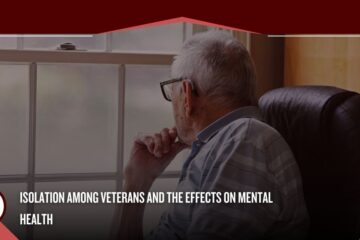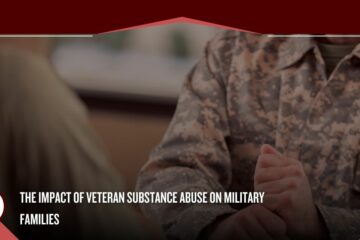
Frequently, the urge to abuse substances comes from undiagnosed or untreated mental health conditions. One of the most common mental health conditions to co-occur with addiction among veterans is post-traumatic stress disorder (PTSD). The U.S. Department of Veterans Affairs (VA) reports that 1 in 3 veterans seeking addiction treatment also has PTSD.[2]
If you are a veteran who has comorbid PTSD and addiction, you must receive treatment for both conditions at the same time. Dual-diagnosis treatment for veterans in Texas often includes an initial assessment, diagnosis, medical detox, trauma-informed therapy, and aftercare support.
How is Post-Traumatic Stress Disorder (PTSD) Connected to Addiction?
Post-traumatic stress disorder (PTSD) is a condition that develops after you are experienced in a traumatic event that impacts you greatly. The symptoms of this condition may include traumatic memories, flashbacks, nightmares, changes in mood, social isolation, and more.[3] Since the symptoms of PTSD can impact every area of your life, many people look for ways to self-medicate.
Veterans with PTSD often turn to alcohol or drugs to soothe their symptoms when they do not have access to treatment. Over time, using substances to cope with the symptoms of PTSD can lead to dependency, tolerance, and eventually addiction. Unfortunately, addiction will only further complicate the symptoms of PTSD, making it imperative that you seek help from a dual-diagnosis rehab program in Texas.
How is PTSD and Addiction Among Veterans in Texas Treated?
If you are a veteran suffering from co-occurring PTSD and addiction, it’s time to consider professional treatment. While attending rehab can be scary, knowing what to expect can make entering treatment much easier.
During PTSD and addiction treatment for veterans in Texas, you can expect the following:
Assessment and Diagnosis
Upon arrival at a dual diagnosis treatment center for PTSD and addiction, you will undergo an initial assessment. These assessments help the medical team create an individualized treatment plan by gathering information about your physical and mental health as well as your history of substance abuse. Additionally, they can allow mental health experts to determine if post-traumatic stress disorder is the correct diagnosis.
Medical Detox
Once your individualized treatment plan is created, you will begin medical detox. When you are addicted to alcohol or a drug, your brain and body become dependent on it. This means that suddenly stopping the use of a substance will result in withdrawal symptoms.
Medical detox helps you overcome withdrawal by providing you with medications and treatments that soothe your symptoms, prevent cravings, and keep you stable. The type of medications you are given will depend on the substance you are addicted to.
For example, people who suffer from opioid addiction might receive Suboxone or methadone while individuals addicted to stimulants will receive a variety of medications that target specific symptoms.
Trauma-Informed Therapies
After detox, you will begin trauma-informed therapy. Trauma-informed therapies are used to help you recover from both PTSD and addiction by using techniques that help you feel safe and comfortable when sharing information about your trauma.
You will participate in both individual and group therapy, as both settings provide their own set of benefits. On one hand, individual therapy can provide you with a one-on-one setting to talk about your trauma privately with your therapist. On the other hand, group therapy offers a safe space to talk about your PTSD and addiction with your peers and learn healthy social skills that are necessary for recovery.
Relapse Prevention Planning and Aftercare Support
Lastly, treatment for PTSD and addiction among veterans in Texas uses a technique called relapse prevention planning. Because relapse is common among people with addiction, treatment centers use this technique to equip you with the tools and support you need to maintain long-term recovery outside of a rehab facility.
Common tools and services included in aftercare include:
- A list of triggers to avoid and healthy coping mechanisms to use
- People you can call for support in times of need
- A schedule that involves therapy, support groups, and self-care
- Recommendations on local support groups to attend like 12-step meetings
- Referrals to outpatient or sober living housing programs
- Access to an alumni support group
Find Treatment for PTSD and Addiction for Veterans in Texas
If you or a loved one is a veteran who struggles with comorbid PTSD and addiction, it’s time to seek help. Dual-diagnosis rehab centers in Texas can offer you the trauma-informed addiction treatment you need to make a full recovery.
At Alamo Behavioral Health, we cultivate an environment of healing and comfort, allowing veterans to recover from addiction and reclaim their lives. To learn more about our treatment center for PTSD and addiction for veterans in Texas, contact Alamo Behavioral Health today.
References:
- The National Institute on Drug Abuse (NIDA): Substance Use and Military Life DrugFacts, Retrieved November 2023 From https://nida.nih.gov/publications/drugfacts/substance-use-military-life
- The U.S. Department of Veteran Affairs (VA): PTSD and Substance Abuse in Veterans, Retrieved November 2023 From https://www.ptsd.va.gov/understand/related/substance_abuse_vet.asp
- The Substance Abuse and Mental Health Services Administration (SAMHSA): What is Post-Traumatic Stress Disorder, Retrieved November 2023 From https://www.samhsa.gov/mental-health/post-traumatic-stress-disorder



